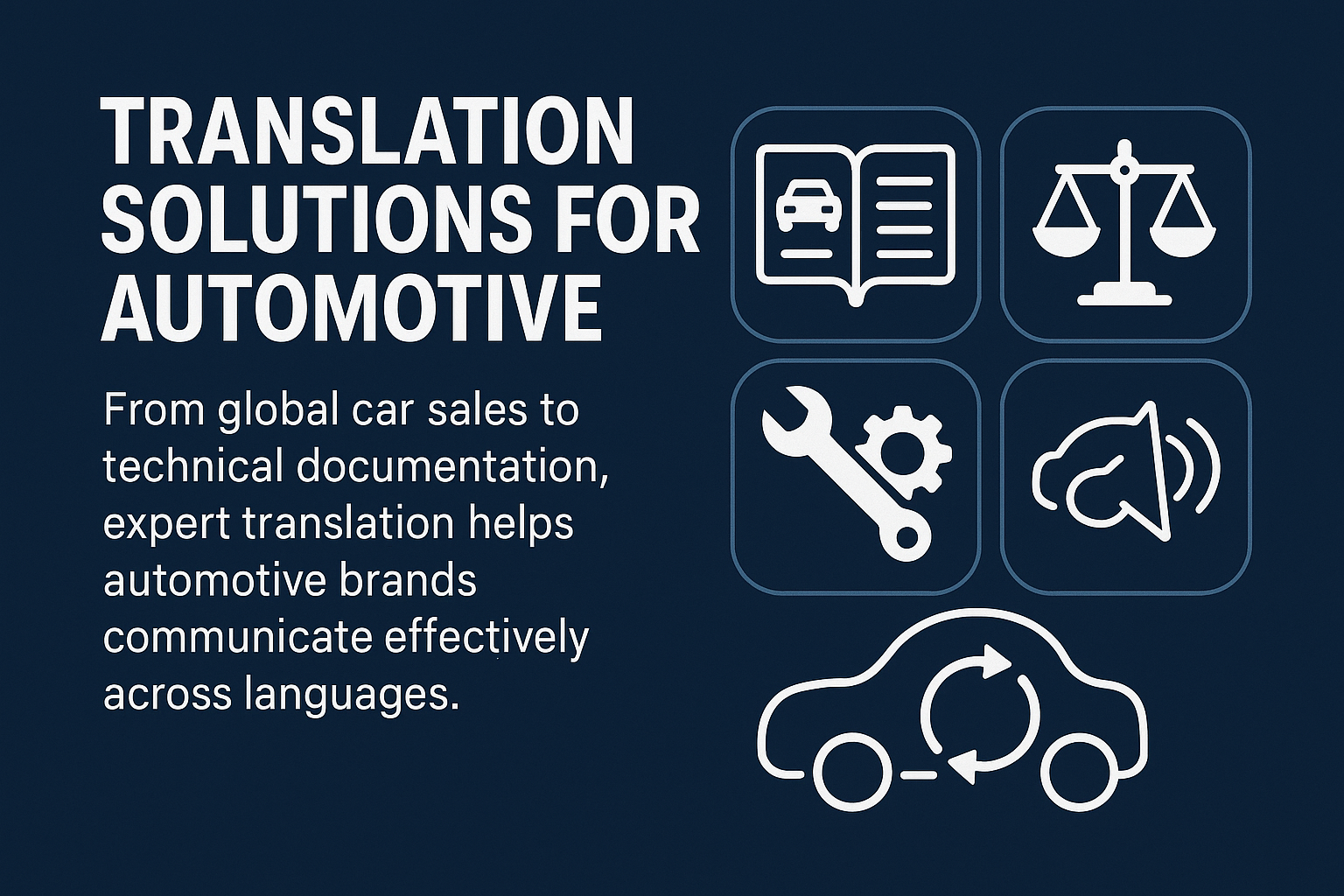How Do Translation Solutions for Automotive Help?

The U.S. automotive industry isn’t just about building cars; it’s about selling experiences across borders. Whether you’re a Detroit-based manufacturer or a California EV startup, your content, manuals, software, and ads need to connect with global customers. That’s where translation solutions for automotive step in.
Let’s explore how expert translation can drive real business results for automotive brands.
1. Global Car Sales Need Local Language
Selling a vehicle in Mexico or Germany? You’ll need more than just product specs. Customers expect:
- Localized user manuals
- Translated dashboards and infotainment systems
- Accurate service instructions
- Multilingual websites and ads
To illustrate, Toyota’s steady international expansion is largely attributed to its dedication to translating material into more than 35 languages for customers, technicians, and dealerships. Its translation approach guarantees clarity and conformance in every market.
For businesses aiming to match that level of global outreach, Globallink Web offers expert website translation services that ensure consistency, cultural relevance, and a seamless user experience across languages.
2. Translation Keeps You Legally Compliant
In France, Canada, and Germany, not issuing product documentation in the official language can result in a fine or product recall.
An actual case:
An American auto parts manufacturer once had to pay a €50,000 penalty in France for distributing safety parts without installation manuals translated into local languages. That was an expensive error that could have been avoided by a professional translation agency clients trust.
With precise translations, you remain compliant with national legislation, safety standards, and vehicle certification procedures.
3. Technical Accuracy Fosters Trust
Car content is replete with jargon, torque values, fluid types, engine codes, etc. Misunderstanding these figures in translation may lead to confusion or accidents.
Automotive translation solutions involve linguists specializing in:
- Engineering papers
- CAD drawings
- Maintenance manuals
- Diagnostic software
A good example is Bosch, which relies on language experts to have its car parts and diagnostic equipment properly localized for mechanics all over the world.
4. Rising Customer Satisfaction
Picture yourself purchasing a car and getting a manual written in another language. Frustrating, isn’t it?
A bad translation leaves customers as an afterthought. But when car owners are able to get a smooth experience translating mobile apps, service reminders, and customer support, they’re more likely to trust and remain loyal to the brand.
Hyundai’s MyHyundai app, for instance, is available in multiple languages and includes features like roadside assistance and service booking in the customer’s preferred language.
5. Supporting Digital Transformation
Modern vehicles are smart. With built-in AI, voice commands, mobile connectivity, and subscription-based features, the software inside a car is just as important as the engine.
Translating digital content is essential for:
- Navigation and voice assistants
- Mobile apps connected to vehicles
- Over-the-air software updates
- Subscription offerings (such as OnStar or Tesla Premium Connectivity)
In this case, translation solutions for automotive must conform to UI/UX, voice localization, and real-time content delivery. A single misstep in the software interface may be enough to ruin user flow or even create safety problems.
6. Emotionally Connecting Marketing
Automotive marketing is more than specs it’s storytelling. Yet what sounds so great in English may not work in Japanese, Arabic, or Portuguese.
Consider Ford’s iconic tagline, “Built Ford Tough.” Translating it into other languages has a way of draining the cultural significance. Rather, professional translators customize the message, tone, and feeling for every audience—without sacrificing brand identity.
Mercedes-Benz and BMW work with translation firms that are client-trusted to ensure their high-end brand image is conveyed across cultures without loss of integrity.
7. Minimizing Returns and Support Requests
When installation guides, guarantee conditions, or software guides are unclear, it leads to:
- Increased customer support expense
- Product returns
- Negative comments
- Harmed brand reputation
A U.S. auto parts brand case study experienced a 35% reduction in service tickets after investing in professional translation of product instructions in Spanish, French, and German languages.
8. Assisting Dealerships and Technicians
Your in-country technicians and dealership partners require:
- Training documents
- After-sales service manuals
- E-learning content
- Diagnostic tool guides
If these materials are not translated correctly, it results in substandard service quality and variable customer experiences.
Volvo, for instance, provides completely localized e-learning courses for its dealership network, enhancing repair efficiency and boosting technician certification percentages all over the world.
9. Managing Multilingual Supply Chains
Auto firms tend to source parts and deal with suppliers all over the world—Japan to Mexico to Poland.
Unambiguous communication is essential for:
- Quality control documents
- Supplier agreements
- Production timetables
- Compliance audits
This is where translation business partners truly make a difference—through eliminating miscommunication that can slow production or lead to expensive mistakes.
Why Select the Right Translation Partner?
Not all translation companies grasp the complexity of the automobile industry. You require a partner who:
- Provides subject-matter specialists
- Supports multiple languages
- Utilizes translation memory tools
- Provides fast turnaround with QA
CCJK translation company, trusted by clients, is a top industry pick. They have 30,000+ translators and 230+ languages to offer, having assisted international brands in localizing technical content, UI, and marketing materials with precision and efficiency.
Last Words
Automotive translation solutions are not a “nice to have“; they’re a necessity for global scaling, safety, and loyalty.
From circumventing legal hazards to capturing new markets, the correct translation companion can spark your brand’s global success.
Whether you’re in the auto industry, OEMs, components suppliers, or electric vehicle startup,s begin investing in business translation today. It’s not merely words; it’s about propelling trust, safety, and satisfaction globally.



